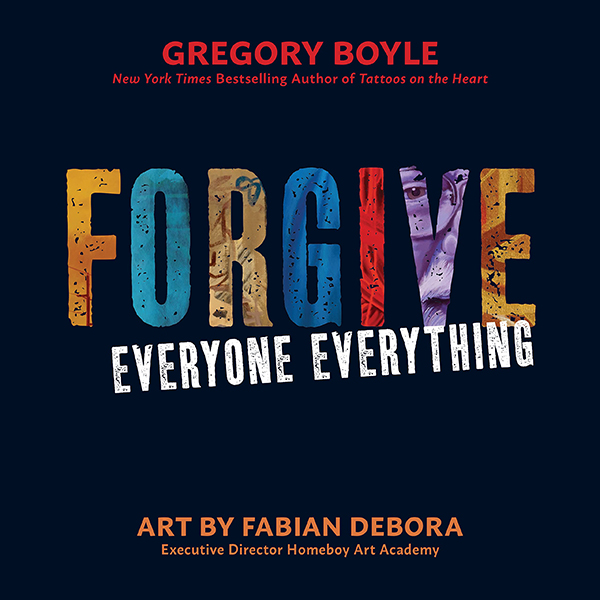
Book review: ‘Forgive Everyone Everything’
“Forgive Everyone Everything.” By Father Gregory Boyle. Art by Fabian Debora. Chicago: Loyola Press, 2022. 112 pages. Paperback: $21.99; Kindle: $18.80.
When times are chaotic and the news seems filled with everything that is going wrong, it is refreshing to encounter hope in one of the last places you would ever think such a thing existed. “Forgive Everyone Everything” by Father Gregory Boyle is just such a place and just such a book; though able to be read in one sitting, its message reverberates far beyond the hour or so it takes to peruse its pages. By the time the reader gets to the end, he or she is emphatically reminded that, with God, all good and noble things are possible.
For those of you who are not familiar with Father Boyle’s work, a little background is in order. From 1986 to 1992, the Jesuit priest was pastor of Dolores Mission Church which, at the time, was the poorest Catholic parish in Los Angeles. It also had the highest concentration of gang activity in the city. He witnessed firsthand the devastating effects of gang violence and, in 1988, he, his parish and community members decided to try something different to end it.
Thus was born what would eventually become Homeboy Industries, “the largest gang rehabilitation and reentry program in the world … providing training and support to formerly gang-involved and previously incarcerated people, allowing them to redirect their lives and become contributing members of our community.”
In “Forgive Everyone Everything,” Father Boyle has drawn from the stories he told in some of his previously published work, including “Tattoos on the Heart” and “Barking at the Choir.” Most of them have happy endings, some not so much, but every story of every person included here is steeped in the enduring message of the Gospel. Indeed, each one – and they only occupy about two pages apiece – begins with a passage from scripture that sums up the message this person’s life teaches.
In addition to the written word, the book is filled to overflowing with the artwork of Fabian Debora. An artist in his own right, Debora is also executive director of the Homeboy Art Academy, and his paintings burst off the page with color and life, translating the world of these special people into something holy and beautiful.
Lest the reader think that these stories have a tinge of Pollyanna about them, let me hasten to assure you that they do not. Instead they illustrate that, as Father Boyle says, “The highest form of sanctity is to live in hell and not lose hope.”
Take the story of Ramoncita as an example. Even as an elderly woman – “I think she was 103 when she died” writes Father Boyle – she nonetheless often did the readings at daily Mass. Besides her obvious affection for and comfort with her God, she was sometimes difficult to understand as she did not have a single tooth left in her mouth. “The word was,” explains Father Boyle, “that Ramoncita had at one time sported perfectly aligned dentures until one day in the projects she spotted a young mother trying to corral her kids. This mother had no teeth. Ramoncita approached her, pulled the entirety of her dentures out of her mouth and said, ‘Clean these up, they should work fine. You need them more than I do.’”
There are a few words which resonate throughout this book – hope, resilience and especially joy, but as St. Paul reminds us, the greatest word of all is love. “In the culture of tenderness,” Father Boyle tells us, “homies ‘detoxify’ and discover the authority of their own voice, and their true and sacred selves. In the process, they find a love that can go anywhere.”
This book reminds us that that love is around each and every one of us, and that love’s name is God.
Author bio:
Father Gregory Boyle is the founder of Homeboy Industries in Los Angeles. Now in its 31st year, Homeboy has become the largest gang-intervention, rehabilitation and reentry program in the world. Father Boyle has received the University of Notre Dame’s Laetare Medal and California Peace Prize. He is the author of the New York Times bestsellers “Tattoos on the Heart: The Power of Boundless Compassion” and “Barking at the Choir: The Power of Radical Kinship.”

